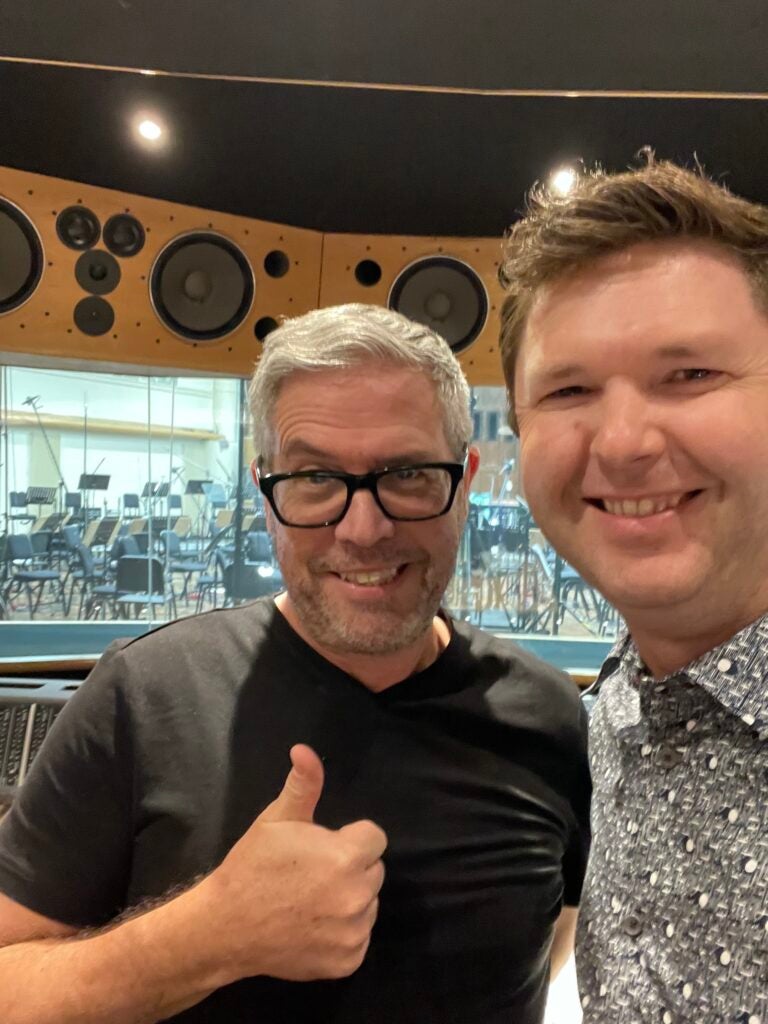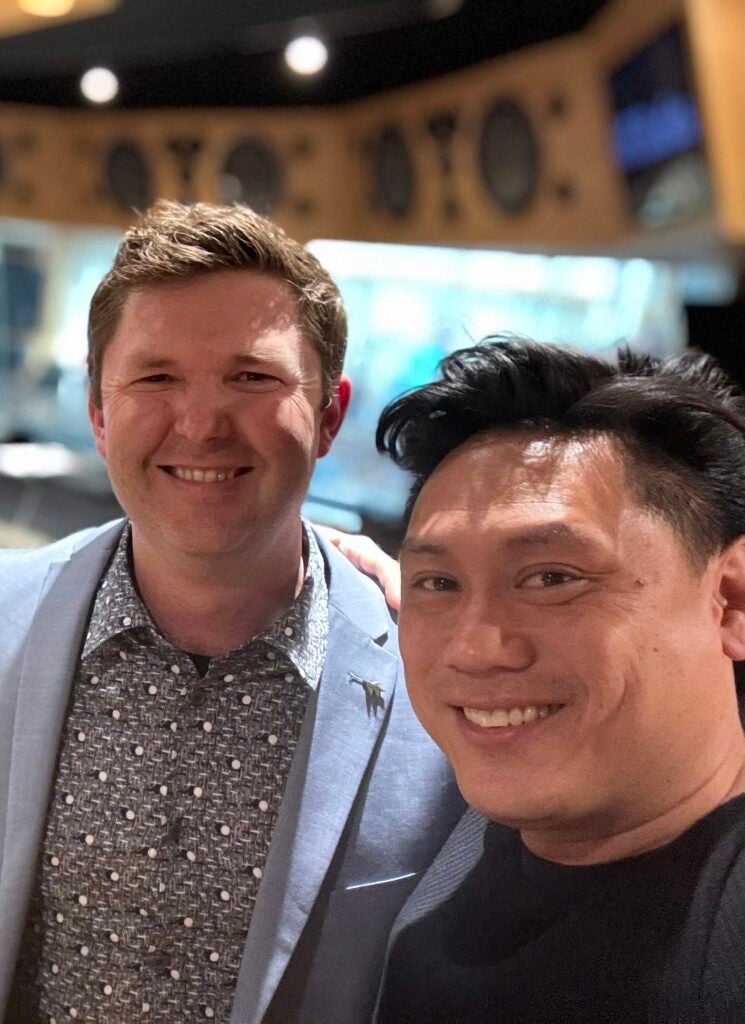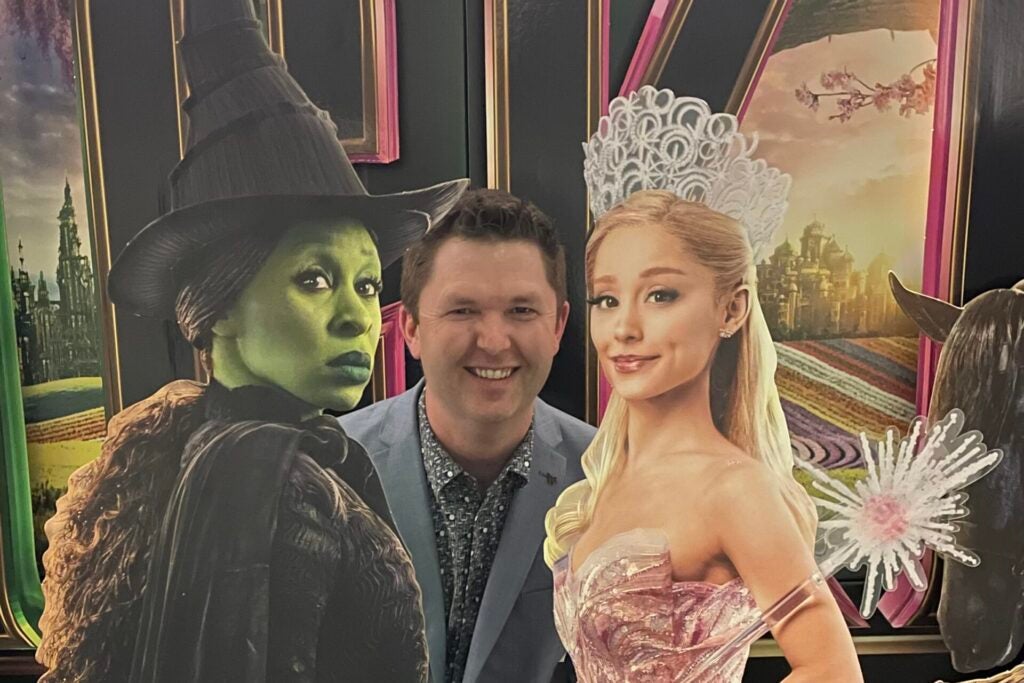One of this holiday’s biggest blockbuster film releases is Wicked, the film adaptation of the smash 2003 Broadway musical. Crowds flocked to the theaters to see the movie over the Thanksgiving weekend in what has been a record-breaking season for Hollywood theatrical releases.
Jonathan Beard, lecturer at The UCLA Herb Alpert School of Music, was one of the supervising orchestrators of the music for the film. Along with his team, the Emmy-winning composer, orchestrator and arranger also helped with some of the song arrangements. Wicked, the Original Motion Picture Score will be released by Verve Records on Friday, December 6. We sat down with Beard to talk about his artistic process, how Wicked compares with his other projects, and the pressures of orchestrating for a film with such a dedicated and vocal fan base.
# # #
I’ll ask the question I’m sure every aspiring film orchestrator would ask—how do you get a gig like Wicked?
My orchestration partners Henri Wilkinson, Edward Trybek, and I have a general philosophy that guides us: “strive to be on each list.” If a composer reaches out to their colleagues and requests numerous recommendations, and if we are on multiple lists, or if numerous people vouch for us, then it goes a long way toward showing that composers can trust us in a high-pressure situation.
Is that what happened here?
Essentially yes. We were recommended to John Powell [the composer who co-wrote the score for the film adaptation Wicked] from multiple sources, and he set a meeting with us.
What was the meeting like?
John wanted to get to know Ed, Henri, and myself; it was clear that he was feeling us out. But one thing that really struck me was that he wanted the three of us to feel him out as well. He wasn’t just looking for yes-men. He was looking for other musical minds that he could trust and who had opinions and could make decisions.
He was looking for a collaborator.
To be clear, there was no doubt at the meeting that he was in charge, that he would be in charge if he hired us. If we were to have a disagreement, he would make the final decision. But yes, he wanted people with their own ideas and instincts.
And so, the meeting was a get-to-know you type of talk, but we also got into talking about music, which, for a bunch of music nerds, is really fun. The hours ticked away. The meeting lasted all afternoon.

Describe what kind of work you were doing on the film.
Our job was to take John’s [John Powell’s] finished demos of the instrumental cues in the underscore that he and Steven [Schwartz, the composer of the original Broadway musical] had created and prepare those to be ready to be executed flawlessly by a symphony orchestra right off the bat.
The underscore is the music in-between the songs, right?
Yes. It’s the music that underscores the dramatic space in-between songs.
Isn’t most of that music more-or-less determined by the songs themselves?
It’s certainly influenced by them. Wicked is a huge musical property, and that adds a layer of complexity. Steven Schwartz was heavily involved in the film.
But there are several things that make a film score different than an original Broadway musical score. I mean, there’s always room to grow when you create a new adaptation, but film adaptations almost make growth a requirement.
Why?
First thing is that you have a different orchestra. Broadway is limited to a pit orchestra. For a film that is grand and epic, you have more tools at your disposal. Your orchestral forces are going to grow. But you also have more types of dramatic storytelling that you can do on film that you can’t do on a stage show, which can benefit from new underscore.
Can you give me an example?
For instance, you have bits of close, personal interactions between characters on film that you don’t necessarily get on a stage. And there are subtleties throughout. I think there ended up being more than 90 minutes of newly composed score composition for the film.

You’ve worked on many different kinds of composition projects, including documentaries. Are there major differences between those projects and working on something like Wicked?
Well, the scale is one big difference. We had hundreds of people working on the music for Wicked. And documentaries often have complicated or difficult subject matter. They can be intense in a small way; not epic the way a big movie can be. So, in some ways, working on projects like that feels like 180 degrees in the other direction.
However, the function of music underneath is not all that different. At the end of the day, the score is there to help deepen your emotional connection to the story being told. It’s another form of storytelling. It’s not telling through visuals or words, but through sound.
Sometimes film music can get a bad rap. Some people think it is manipulative in some way, it is tricking you emotionally. But I don’t think that is the case.
It’s about storytelling.
Yes. And execution. A quiet documentary is going to benefit, if it is done sensitively and with care, from the dramatic guide that music can embody. It can be a partner to help lead you through an emotional journey.
And then, you flip to something as big as this, and that’s still what is going on. You have masters of the craft (Schwartz and Powell) bringing you along on the dramatic journey, but on an epic scale. It’s a pretty dizzying and fantastic result.
